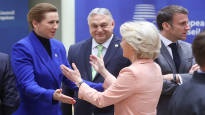BRUSSELS EU leaders reached an agreement on using the interest income from Russia’s frozen funds to arm Ukraine. The decision required the approval of all member countries. In advance, it was suspected that the project would fail in Hungary, which opposed spending the money on defense spending.
Prime minister Petteri Orpon (co.) according to Hungary ultimately took a constructive approach to the matter.
– Today, Hungary did not stand in the way of decision-making, Orpo told a press conference late in the evening.
The neutral countries Austria, Ireland and Malta also found it difficult to use the funds for military expenses. President of the European Council Charles Michel stated that the “special sensitivities” of these countries have been taken into account.
Interest income from Russian assets is about three billion euros per year.
About 200 billion euros of funds are frozen. This amount will not be touched now, but the Prime Minister of Estonia Kaja Kallas during the meeting, it was also possible to put the capital into use later.
According to Orpo, the commission is investigating the introduction of capital, but the solution also requires international cooperation.
– I don’t mind if there is a way that complies with international law in which these own funds can also be utilized.
In his opinion, Russia should be held accountable for the war crimes and destruction it has caused.
According to Orpo, there was a common understanding at the meeting about how critical the frontline situation is and how badly Ukraine needs weapons and ammunition.
Finland is not enthusiastic about joint debt
The summit also discussed strengthening the EU’s defense industry.
– The Russian threat is the real reason why Europe needs to be able to increase its own defense capabilities, i.e. its industrial capacity. It must be answered by the actions of the member countries, but joint European actions are also needed.
Increasing the defense capability requires considerable money. Estonia and France are proposing Eurobonds, i.e. joint borrowing, as a solution.
– Finland has a negative and very critical attitude towards collective debt. At the same time, we must be able to find solutions for how to increase defense industrial capacity and investments.
Germany, the Netherlands and Sweden oppose the joint debt of the member states. The EU took on a joint debt for the recovery package agreed during the corona era, and at that time it was emphasized that the debt was one-time.
According to Finland, other financing must be sought before taking on debt. Finland is pushing to change the rules of the European Investment Bank so that the institution could finance the defense industry. In total, 14 member countries signed the initiative, but according to Orpo, the popularity increased at the meeting. Changing the bank’s operations does not require unanimity.
Finland’s initiative of a preparedness union emphasizing crisis management also received support from the summit and the project is moving forward.
FT: Arms from the common budget
Newspaper Financial Times (FT) reported that there are plans in the EU to change the basic treaties so that weapons could be bought from the common budget in the future.
Orpo understands the idea because the rules were made in a different time.
– Now we are in a situation where the other side has no rules and has moved to a war economy. We are forced to look at these rules we have made for ourselves, which prevent us from being able to direct funds efficiently enough to exactly what is needed, i.e. helping Ukraine and defending democracy and freedom.
However, changing the basic agreement is not considered likely now.
The EU is finally demanding a ceasefire with Israel
The member countries reached an agreement on demanding a ceasefire in the Middle East.
– I have personally found it embarrassing that the EU has not been able to give a common vision earlier. Finland has been active in resolving the Gaza crisis in the Middle East. The fact that we now finally have a common position is necessary, Orpo said.
In addition to a cease-fire, the EU demands the delivery of humanitarian aid by road and sea. In addition, the Union appeals to Israel not to carry out a ground attack on Rafah.
The meeting condemned the terrorist attack by Hamas that started the crisis. At the same time, the member countries demand the release of the hostages taken by the extremist organization.
All parties are required to respect international law. The EU’s long-term goal is a two-state model.
